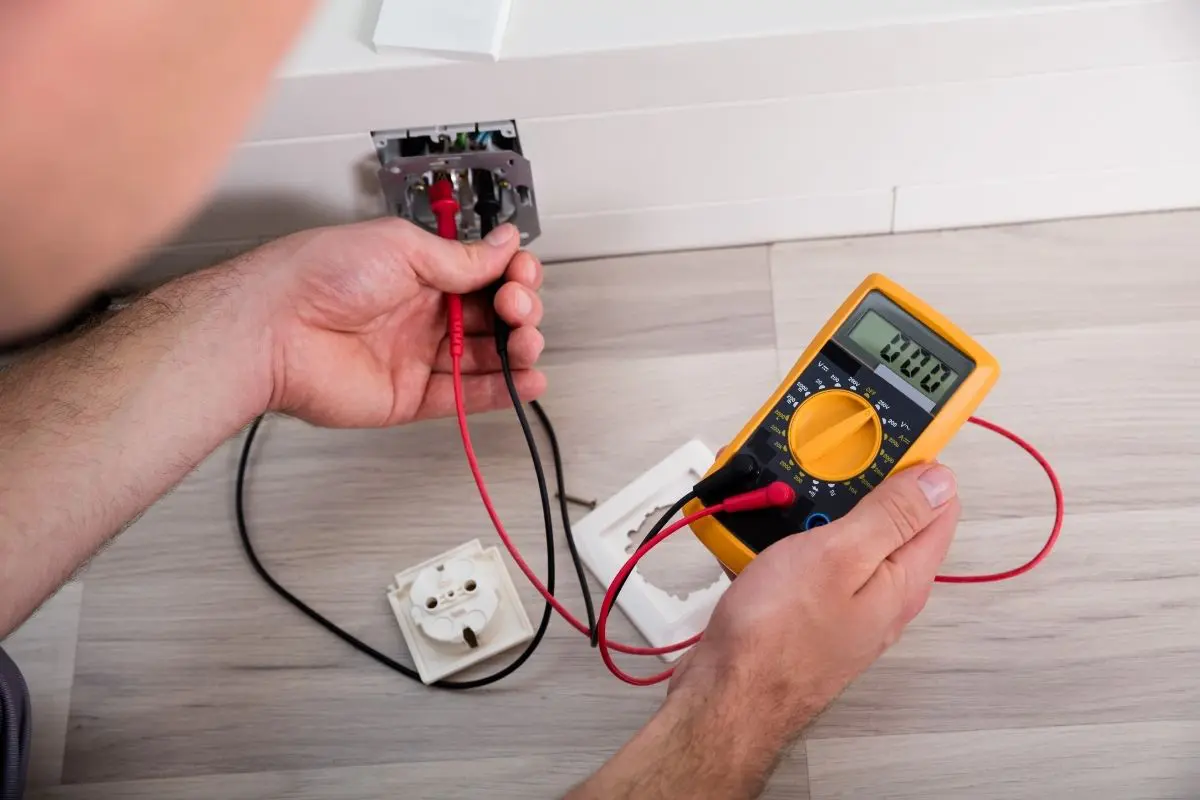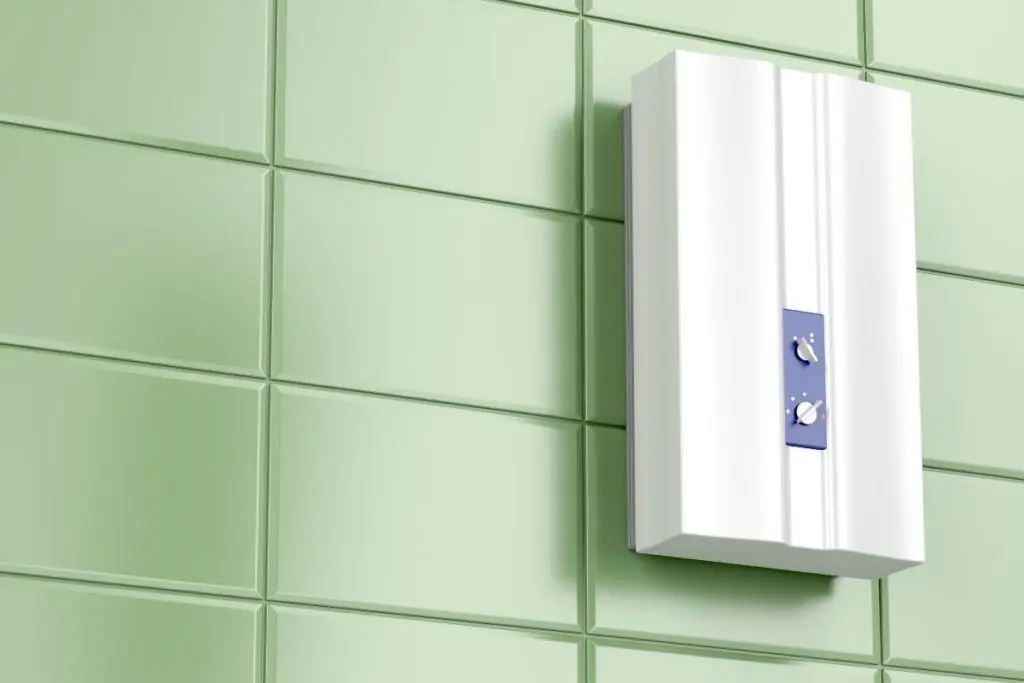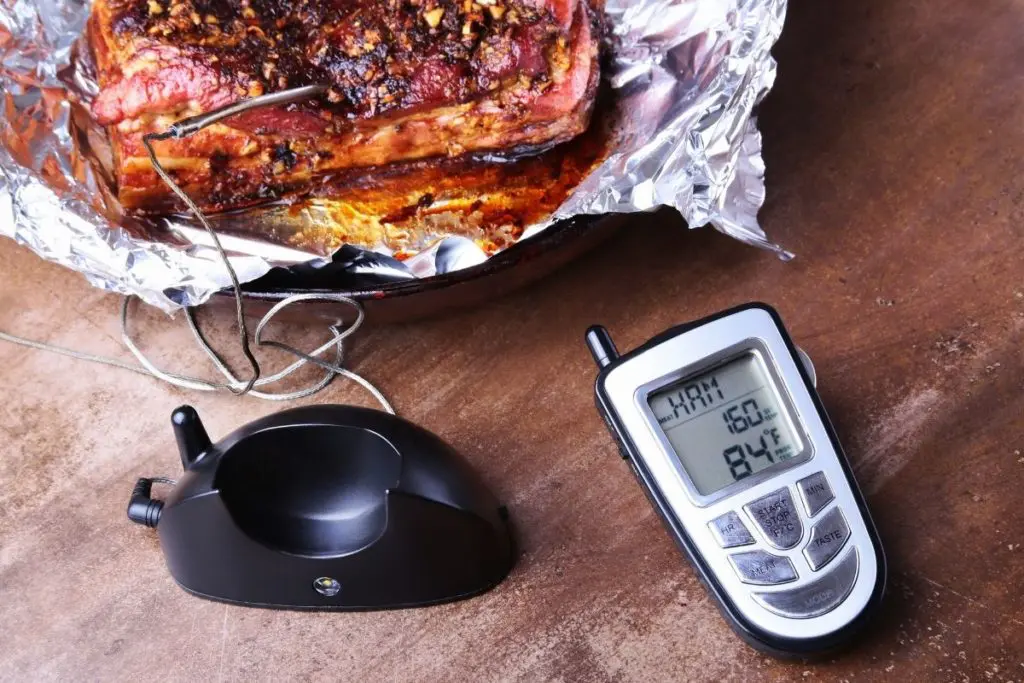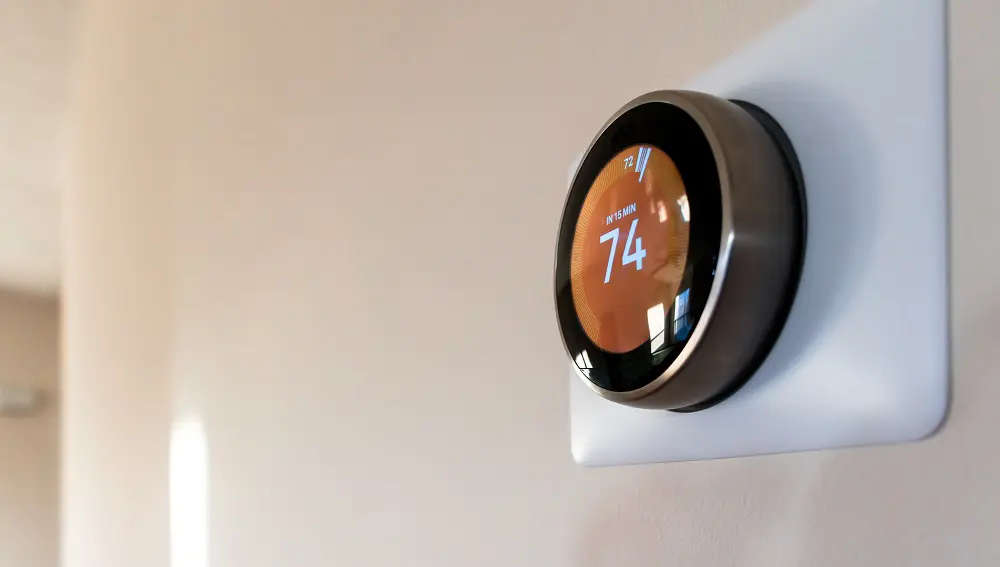With so many different multimeters on the market, it can be hard to know which one will actually get the job done. That’s why we’ve taken the time to compile this guide of the best multimeters, so you can find the perfect multimeter for your needs.
Our Top Picks
Short on time? Here’s a quick overview:
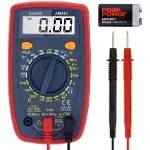 | Best Overall (and Best Budget!): AstroAI Digital It’s rare that our Best Overall pick is also the best pick on a budget, but the AstroAI Digital blew us away with its performance and affordable price. |
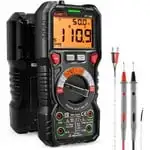 | Best for Home Use: KAIWEETS Home Multimeter Whether you’re an avid DIYer or just a homeowner with a few improvement projects on the honey-do list, this simple multimeter is easy to use, comes with added safety protections, and has all the features you need to get it done. |
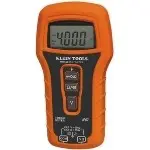 | Best for Electronics: Klein MM500 If you deal with a lot of different electronics, then the mid-level auto-ranging Klein MM500 is for you. |
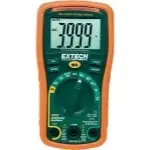 | Best Compact: Extech EX330 This lightweight, compact multimeter comes with a built-in thermometer and is perfect for on-the-go readings. |
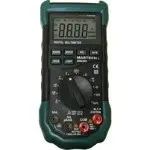 | Best Auto Ranging: Tekpower Mastech MS8268 If you’re set on auto-ranging, the MS8268 definitely does it best – but if you aren’t sure, don’t worry. You can switch back and forth between auto-ranging and manual ranging! |
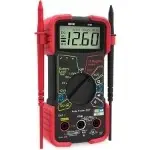 | Most Durable: INNOVA 3320 The INNOVA 3320 features reinforced drop protection on all corners to ensure your device can easily take a beating without missing a beat. |
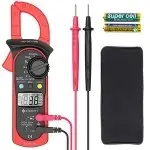 | Best Clamp: Etekcity MSR-C600 This trigger-activated clamp multimeter makes it easy to measure AC currents without disrupting the circuit. |
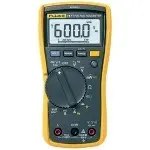 | Best for HVAC: Fluke 117 If you work with HVACs on the daily, then you’ll love the Fluke 117’s built-in thermometer and microamps feature. |
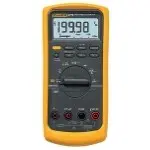 | Best for Electricians: Fluke 87-V For professional electricians (and those who want professional-level equipment), this auto and manual ranging multimeter features a hybrid analog and digital readout, and is one of the best multimeters Fluke has to offer. |
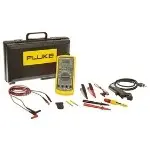 | Best Automotive: Fluke 88 V/A Though it comes with a hefty price tag, this multimeter kit comes with everything you need for pretty much any automotive testing application you can think of! |
A Closer Look: Best Multimeters
Much like the Multimeters on our list, we’ve got multiple parameters that we grade each listing by. Continue reading below to see how each one measures up.
Our first place multimeter goes to the Astra AI. It features a sampling speed of 2 times per second and the ability to troubleshoot automotive and household electrical issues without hazard. It’s one of the best value multimeters at under $15. In fact, it’s so affordable, you can buy one to keep in your car, one to keep in the house, and one to keep in the garage! It’s definitely one of the best multimeters for the money.
With overload protection on all ranges, you can troubleshoot all kinds of electrical problems without worry. The backlit LCD screen is easy to read. It offers clear digital measurements for AC/DC voltage, DC current, resistance, continuity, diodes, and more.
Reviewers Like
- Manual ranging with large range switch for easy toggling
- Data hold feature freezes current readout for easier recording
- A built-in kickstand means you have your hands free while measuring
Reviewers Dislike
- Can’t test AC current
- The manual ranging dial is crowded and may be difficult to navigate
The KAIWEETS Digital Multimeter offers a great range of testing capabilities and a variety of safety features that make it our pick for home use. Double insulation protection and safety regulation compliance means you can rest assured you aren’t in danger of overloading. The manual range is adjusted via a simple dial with clear markings, so you get your range right the first time.
What really makes this multimeter stand out above the rest is its LED jack indicators. Once you’ve set the dial to the function you need, an LED indicator will light up to tell you which jack corresponds to the function you’ve selected. This takes the guesswork out of socket choice, and makes it arguable the best multimeter for electronic hobbyists.
Reviewers Like
- Large LCD backlit display with LED jack indicator lights
- Non-contact NCV measuring for easy AC signal detection
- Battery-smart low-drain flashlight feature lights up workspace
Reviewers Dislike
- Included thermistor isn’t as accurate as the voltage readings
- Flashlight and LCD screen backlight have to either both be on or both be off
The Klein MM500 is, in our humble opinion, the best multimeter under 50 dollars. This mid-level auto-ranging multimeter has all the features you need to test pretty much any electronic. Whether you’re making repairs on electric ranges, outlets, switches, breakers, refrigerators, or poking around your vehicle, trailer, or RV, this multimeter can do it all. And with true-RMS, it can do it accurately, making it one of the best multimeters for electronics. IP 67 casing means your device is protected against both dust and water, and the 10-foot drop rating means it can take a beating.
Reviewers Like
- Integrated clips on the back for probe storage
- Red LED indicator light for positive continuity check
- Rugged design is dust-proof, water-proof, and drop-resistant
Reviewers Dislike
- Only measures down to 0.1 volts
- With only 3 buttons and more symbols than words, some users found it difficult to operate at first
The auto-ranging Extech EX330 is a lightweight, compact device perfect for bringing on the road. It can test current, capacitance, frequency, continuity, diode, duty cycle, resistance, and voltage. You also get a continuity tester. A built-in tilt stand means you can set the device up and measure hands-free. The data readout can be set to max hold/data hold/relative for easier recording and comprehension.
On top of all that, it comes with an integrated thermometer – a feature that makes many other multimeters skyrocket in terms of price. Though this model is aimed at the professional market, it’s definitely suitable (and affordable) for hobbyists.
Reviewers Like
- Includes type-K temperature probe
- Built-in non-contact AC voltage detector
- The transmitter and receiver snap easily together for more compact and secure storage
Reviewers Dislike
- Changing settings resets AC back to DC
- The non-contact AC voltage detector is fairly weak, and not suitable for accuracy-dependence
The Mastech MS8268 multimeter is the latest from the trusted brand Tekpower. We’ve picked it as our choice for best auto-ranging, and we stand by that – but the crowning glory of this multimeter is that it’s the best of both worlds. With the MS8268, you can toggle between auto and manual ranging. That means you can choose when you’d rather have the accuracy of manual ranging or the convenience of auto-ranging.
As an added safety, this multimeter features an LED and sound warning should the incorrect banana jacks be used for the set function. There’s also an auto-off to conserve battery power. You can disable this feature for projects where you’ll need your multimeter for longer periods of time.
Reviewers Like
- Built-in kickstand for easy hands-free use
- Data hold freezes readouts on the screen for easier recording
- Auto-off battery conservation feature can be disabled for longer projects
Reviewers Dislike
- Most testing features take several seconds to give results
- The light button only activates light for around 10 seconds before you have to hit it again
This handy little multimeter features a large digital display and auto-ranging scales for ease of use. Color-coded LEDs make it easy to monitor battery charge, so you never run out of power unexpectedly. Plus, the auto shut-off feature helps conserve battery power. Continuity checks use audible beeps for easier measuring, and reverse polarity protection means added peace of mind. The sturdy build quality of this multimeter includes reinforced corners and drop protection.
Reviewers Like
- Built-in probe storage on both sides
- High accuracy in auto-ranging model
- Reinforced drop-protection on all corners
Reviewers Dislike
- The continuity test beeps are very soft, and may be hard to hear with background noise
- Auto-ranging takes a few seconds to scale down to lower voltages, currents, resistances, etc
The Etekcity Digital Clamp Multimeter is a bit different than the other models on our list. It’s a clamp multimeter, designed to make AC current tests as easy as pulling a trigger. Clamp the jaw-style multimeter over an AC current conductor up to 26 mm to measure without interrupting the circuit.
This auto-ranging model packs a big punch for such a small package. The large LCD screen holds information for easy recording and goes into sleep mode automatically after a while to save power. For protection, this multimeter lets you know when you’ve hit a max reading point.
Reviewers Like
- Includes handy carrying pouch for use on the go
- Auto-ranging model with max reading point warning
- Trigger-activated clamp for AC current reading that doesn’t interrupt circuit
Reviewers Dislike
- It can’t measure DC current
- Anything over 20 amps and below 200 amps may cause overload
When it comes to who makes the best multimeters, the answer is pretty universally Fluke. Of all the best multimeters brands, Fluke is the most popular. They make high quality stuff, and the Fluke 117 HVAC multimeter is no exception.
The Fluke 117 HVAC multimeter is, as the name suggests, probably the best HVAC multimeter on the market. Whether it’s heating, ventilating, or air conditioning, you need a specialized multimeter like the Fluke 117. The built-in thermometer and microamps feature is great for HVAC applications.
Despite the name brand, you definitely aren’t paying an arm and a leg. To keep costs lower than other professional-level models, Fluke removed the high amperage selection from this model. This is probably okay since most HVAC applications do not call for averages that go over 1 Amp.
Reviewers Like
- Low input impedance helps prevent false readings
- VoltAlert technology for non-contact voltage detection
- Large backlit LED display for easy visibility in dark environments
Reviewers Dislike
- Continuity checks can take a few seconds to stabilize
- Despite the backlight, the LED display can be difficult to read in low-light settings
Fluke is the leading brand in the multimeter category. All of their products are well polished and provide accurate readings, and the 87-V is arguably the best Fluke multimeter of all. If you’re looking for the best digital multimeter regardless of cost, the Fluke 87-V is a great choice. This is a clear favorite among the online community and seasoned technicians alike.
A pro feature of this multimeter is its capability of measuring up to 20A for 30 seconds at a time. The analog bar readout provides the best of both the digital and analog worlds, meaning you no longer have to choose between easy number reading vs easy pattern reading.
The auto-ranging system is highly accurate, but can be switched off if you want to change to manual. Arguably the best feature of this multimeter is that it will beep at you if you put the wrong thing into the input jack. That makes this unit great for inexperienced technicians and will prevent them from taking the wrong measurement.
Reviewers Like
- Peak Capture technology captures intermittents as fast as 250 µS
- High display resolution to see small changes in displayed readings
- Low-pass filter for accurate frequency measurements on adjustable speed drives (ASD)
Reviewers Dislike
- Some reviewers felt the included leads were too stiff to be functional
- The bright white backlight can be difficult on the eyes in low-light environments
Once again, Fluke makes our list with their 88V. This electric tester kit comes with everything you need for pretty much any automotive measuring endeavor. It can handle both AC and DC voltage, making it one of the best voltage testers out there. It’s also extremely accurate at +/1 1.00 percent. The maximum conductance that it will measure is 60.00 nS.
Whether you’re a professional mechanic or you have minimal auto experience, you know those pesky injectors require regular attention. The Fluke 88V is excellent for measuring signal pulse width and determining the health of an injector.
The Fluke 88V has some sweet stats: 1000V AC and DC, maximum resistance of 50 M, and withstands even the most hazardous of spikes up to 8,000 volts. This unit also has the capability to carry out diode tests on vehicles.
As a bonus, Fluke backs this bad boy with a lifetime warranty.
Includes: 88V multimeter, SureGrip silicone test leads, SureGrip jaw alligator clip set, inductive RPM pick-up probe, TPAK magnetic meter hanger, temperature probe, 2 automotive back probe pins, insulation piercing probe, carrying case, holster, and 9V battery
Reviewers Like
- Built-in thermometer for easy temperature readings
- All-inclusive kit comes with everything you need for automotive applications
- Toggle between manual and auto-ranging to suit your preference or situational need
Reviewers Dislike
- Much more expensive than any other multimeter on our list
- The meter may not fit into the case with the leads attached to it
Do I Need one of the Best Multimeters?
The multimeter is an everyday toolbox staple for electricians, auto-mechanics, and other technicians. True to its name, the humble multimeter acts as three different meters in one: voltmeter, ammeter, and ohmmeter. Basically, it measures electric current, voltage, and resistance.
You don’t have to be a professional to benefit from a multimeter. It doesn’t take a lot of technical knowledge to operate them. They can be used for things like testing batteries, checking extension cords, and even figuring out why that one light switch doesn’t seem to be working. Whether you’re a DIYer, hobbyist, electronics junkie, or just trying to repair your HVAC system, a multimeter can make your life easier.
What Is A Multimeter?

A multimeter tester is an instrument that measures two or more electrical values. Most commonly, multimeters measure voltage (volts), current (amps), and resistance (ohms). Multimeters are standard diagnostic tools for all technicians in the electrical and electronic fields. They make quick work of finding faults in a circuit, and are generally handheld, very portable devices. In fact, without a good multimeter, there isn’t much an electrician can do safely.
Multimeters come in either analog or digital models, though digital is quickly becoming the prevailing choice. Analog multimeters incorporate a microammeter with a moving pointer that displays readings. A digital multimeter uses a numeric display along with other visual cues that help represent the measured readings.
What to Look For in the Best Multimeters
A great deal of what decides which multimeter is best for you is what you plan on using it for. As long as you have one with the right features, it will make your work easier, safer, and more efficient. Other than cost, here are a few other things you should think about before hitting that buy button:
1
Analog vs. Digital
Analog multimeters generally have lower input impedance than digital multimeters. Impedance indicates the sensitivity of the current you’re measuring. The higher the input impedance, the better the meter can measure any type of voltage. With the lower input impedance of analog multimeters, your measurements may potentially be less accurate. Digital multimeters are known for having higher input impedance, which means more accurate readings.
Despite this, some people still prefer analog because of how the measurements are displayed. Digital multimeters use numbers, bar graphs, and other visual cues to convey readings. But, with numbers jumping up and down all over the place, it can be hard to read trends and hold any of those numbers in your head.
Analog multimeters, on the other hand, operate similar to the speedometer in your car. A fixed pointer pivots along a half-circle to indicate readings. Tracking the movement of the pointer can be much easier than tracking number changes, and can allow for an easier visual representation of what’s going on.
Lastly, analog multimeters usually only read the big three: amps, volts, and ohms. These are the most common measurements an electrician will need, but not the only ones. The best digital multimeters often go above and beyond, measuring all kinds of readings that can help make any job quicker, safer, and easier.
2
Auto-Ranging vs. Manual Ranging
Manual ranging multimeters operates within preset ranges. You have to know which range of values your component falls under and input it into the meter. If you don’t select the proper range, you may not get a reading at all. Many of the best budget multimeters are manual-ranging.
An auto ranging multimeter, on the other hand, recognizes what you’re testing automatically. Rather than inputting your range, you can just let the device do its thing. This saves time and hassle, since you no longer need to know things like the resistance, capacitance, voltage, etc. The multimeter finds these values for you.
3
Accuracy
In a perfect world, every multimeter would be 100% accurate, 100% of the time. Unfortunately, this just isn’t the case. Whether imperfect manufacturer processes, cheap components, or user error, there’s a lot that can go wrong.
If you’re working on a professional basis, you probably want to spend the extra dollars to ensure you get a multimeter that will reliably provide accurate results.
DIYers and electronic hobbyists are less dependent on fine-point accuracy. Rather, the best multimeter for the money is one that gets you in the right ballpark.
4
Safety Features
If you’re going to be tackling circuits with more than 30-35 V, you may want to consider getting a multimeter with extra safeties. Overloading a multimeter can cause it to quite literally blow, which can cause lots of damage to your multimeter, your component, and yourself!
Check out the measurement category rating as well as how the multimeter is designed. Other important factors include internal blast shields, shrouded banana plugs on the probes, wide flanges to prevent slippages, isolation slots that prevent arc over, and sufficient input protection.
5
Color
Color might not seem like a big deal, and for most, it probably isn’t. However, if you work in a construction-type setting, you probably want a multimeter that’s bright orange, red, or yellow. This can help prevent accidents or someone crushing your new device.
6
Durability
If you’re planning on using your multimeter around the house, then durability isn’t necessarily an issue for you. However, for those using their multimeter in a professional setting (like at construction sites, etc.), you may want to shell out for a higher quality multimeter with a more durable casing and finish.
Further Reading
